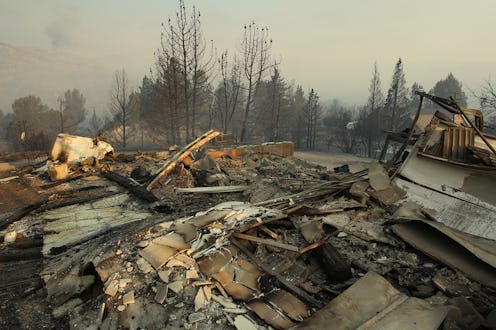News
Will $100 Billion Slow Climate Change?
The United Nations Framework Convention on Climate Change held its 19th session on Monday, just days after the strongest storm ever devastated the Philippines. Held in Warsaw, Poland, the convention hosted representatives from over 190 nations but wasn't expected to produce any concrete decisions on how to address the global problem or warnings that the goal agreed upon in Copenhagen in 2009. That goal — that the increase in global average temperature would be limited to two percent — is unlikely to be reached. Instead, the meeting was seen as a precursor for talks to be held in Paris in 2015, at which time, experts hope, the countries will come to an agreement. The current session instead focused on aid for developing nations, who financially cannot afford to go green on their own.
The developed world has pledged to provide $100 billion in aid to developing nations by 2020, to help them cut greenhouse gas emissions. The U.S. said that it is committed to contributing its share of the $100 billion fund, but that it won’t pay more — as some nations are requesting — to offset the costs some parts of the world are facing as a result of rapid industrialization in other areas over the last 150 years.
“Now [comes] the hard reality,” said the U.S. state department’s special envoy for climate change, Todd Stern. “No step change in overall levels of public funding from developed countries is likely to come anytime soon. The fiscal reality of the United States and other developed countries is not going to allow it.”
That’s a tough pill to swallow for some developing nations — particularly island nations that increasingly have to relocate large portions of their populations due to rising sea levels. In 2012, for instance, the island nation of Kiribati began discussions about buying land in Fiji to relocate its citizens as a last resort. (Major developed nations have already pooled $30 billion, including $2.5 billion from the U.S. alone, to help develop nature-friendly technologies and buildings in the developing world.)
The convention occurred just as a 29-page summary of a UN report on the effects of climate change was leaked. The report, which said that climate change would change society rather than just nature, was confirmed as authentic.
“We see a wide range of impacts that have already occurred ... on people, ecosystems and economies,” said co-chairman of the group writing the report Chris Field. "Looking into the future, we see increasing risks that are more pervasive and more severe with greater amounts of climate change."
The LA Times explains:
The report describes a planet in peril as a result of the human-caused buildup of greenhouse gases since the Industrial Revolution, where glaciers are shrinking and plants and animals have shifted their ranges in response to rising temperatures. As global warming continues through the 21st century, many species will face greater risk of extinction, marine life will shift toward the poles and seawater will grow more acidic, the report says.
By 2100, hundreds of millions of people in coastal areas will be flooded or displaced by rising sea levels. The arid subtropics will have less fresh water, leading to more competition for resources.
The global food supply is also at risk, with yields of wheat, rice, corn and other major crops projected to drop by as much as 2% each decade for the rest of the century, even as demand rises.
Among the other risks forecast in the report: extreme heat waves that will be especially deadly in urban areas, where a growing population will also contend with severe storms, flooding and drought. Rural areas will cope with less drinking and irrigation water and less productive farming.
If someone wants to take a crack at a dystopian novel about the end of the world, there’s your background research. But remember: we almost elected a president who isn’t sure that people — and all the junk we’re pumping into the air — are a contributing factor to climate change. Instead, the GOP is busy trying to take down Obamacare and to limit abortions. It's so absurd, you have to laugh. But Dan Savage already got in trouble for making a joke about it:
Population control. There’s too many goddamn people on the planet. [Audience applause] You know, I’m pro-choice, I believe that women should have a right to control their bodies. Sometimes in my darker moments, I’m anti-choice. I think abortion should be mandatory for about 30 years. [Mix of applause and gasps] That’s a dangerous idea. She wanted a dangerous idea, so throw the chair at me.
That was obviously a joke. But, let's hope those $100 billion result in something.
